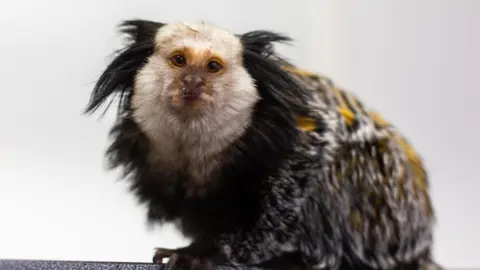Monkey addicted to marshmallows rescued from pet trade
 Scottish SPCA
Scottish SPCACharities have warned of a growing trade in wild animals across Scotland after a monkey was discovered in a bird cage in East Lothian with a marshmallow addiction.
They are calling on the Scottish government to introduce a permitted list of animals that can be legally kept as pets.
OneKind, the Scottish SPCA and Born Free say there are currently very few restrictions, which has led to many creatures suffering in unsuitable conditions.
The young marmoset monkey - called Steve - was taken in by the Scottish SPCA after neighbours spotted him in a living room window in March.
The charity said the four-year-old monkey was underweight and "stressed out" from constant handling.
He had developed an addiction to sugary marshmallows after being repeatedly fed them as a treat.
After six weeks in the charity's care, Steve made a full recovery and was moved to a permanent home in a monkey sanctuary in England.
'Growing trend'
Gilly Mendes Ferreira, the Scottish SPCA's strategic communications director, said people were unaware of the scale of wild animal keeping in Scotland.
"It's a growing and worrying trend," she said.
"Animals like Steve being bought and sold as novelty pets, often on impulse, with little understanding of the complex care they require."
She added: "Marmosets are highly intelligent, social primates that need space, stimulation, and the companionship of their own kind.
"No domestic setting - no matter how well-meaning - can truly meet those needs. "
The Scottish government said it was committed to the highest standards of animal welfare and understood public health and conservation concerns around the keeping of exotic pets.
Research by the animal charities for their new Don't Pet Me campaign suggested requests from children may persuade people to acquire novelty pets.
 Getty Images
Getty ImagesExternal influences like social media, films and games such as Pokémon and Minecraft have also been linked to the trade of wild animals.
Researchers from the charities found that over a 16-week period, creatures from more than 300 species were advertised for sale in Scotland.
They said the trade was an international business with some animals transported by couriers in inappropriate containers - sometimes without any indication a live animal is inside.
A Scottish government spokesperson said: "We welcome the work of groups in dealing with the welfare problems caused by irresponsible owners and the campaign for raising awareness of this important issue.
"The Scottish Animal Welfare Commission has explored the issues surrounding the keeping of exotic pets and we will continue to consider the steps that could be taken in this area."
